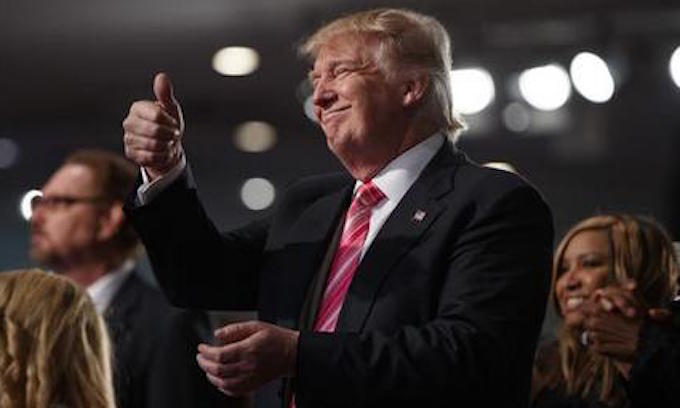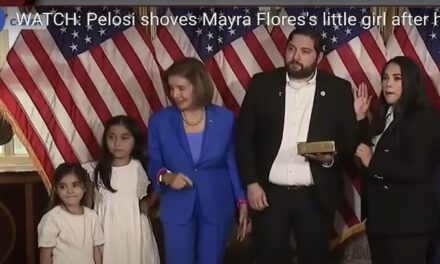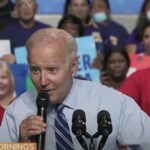Republican presidential nominee Donald Trump vowed to black Christians at the Great Faith International Ministries (GFIM) church in Detroit, Michigan, on Saturday that he is on their side and will fight to make things right for African American communities from coast to coast.
Immediately after sitting down with GFIM Pastor, Bishop Wayne Jackson, in an interview that will eventually air on the Impact Network – an African-American-founded Christian television network – Trump promised congregants that he will approach the black community’s plight with empathy and justice.
“I fully understand that the African-American community has suffered from discrimination and that there are many wrongs that must still be made right,” Trump assured from the pulpit, according to Newsmax. “They will be made right.”
Making Detroit great again
He then focused his attention on Motown, which he believes has a bright new future.
“I want to make this city the economic envy of the world,” the billionaire expressed to the Christian crowd. “We can do that. We can do that again. Factories everywhere, schools – especially schools – and new hope.”
Trump extrapolated on the big plans he has for struggling African Americans, insisting that he is “determined” to take action steps so that wages will no longer drop and jobs will stop disappearing.
“When I see wages falling, people out of work, I know the hardships this inflicts and I am determined to do something about it,” he continued, CNN reports. “[I’ve sort of seen and lot [and want to bring]wealth and prosperity and opportunity to those who have not had these opportunities before – and that’s many, many people in Detroit. I do get things done. I will tell you, I’m going to get things done. I’m going to get things done for you.”
Of dollars, justice and religious freedom
Switching from economic woes to injustice experienced by the black community, Trump commended the African American Church for its part in forwarding the civil rights movement based on biblical principles.
“It’s from these pews that our nation has been inspired toward a better moral character,” the somewhat newly proclaimed born-again Christian presidential candidate asserted. “[The African American community has been one of God’s greatest gifts to America and to its people [and the best thing we can do to heal the nation is to] provide a greater platform to the black churches and churchgoers.”
He then went on from civil rights to religious rights, vowing that he would do all he could to protect the right of churchgoers to worship and express their faith according to their sincerely held Christian beliefs.
“Our nation is too divided,” he told the audience, while expressing his hope that his appearance at the church would help it to spread its message to new audiences. “We talk past each other and not to each other.”
Trump shared his desire and conviction to end the disconnect between Washington and the ordinary American – telling how his administration would put boots on the ground to get an accurate read of the needs and desires of America’s everyday people.
“And those who seek office do not do enough to step into the community and learn what’s going on,” the 70-year-old businessman insisted. “I’m here today to learn, so that we can together remedy injustice in any form, and so that we can also remedy economics so that the African-American community can benefit economically through jobs and income and so many other different ways.”
After earlier proclaiming that it “was one of the great honors of my life” to be named as the nominee Abraham Lincoln’s party, the Republican said new approaches to justice must be made.
“I believe we need a civil rights agenda for our time,” Trump declared at the church, where he was seen before his speech worshiping in the pews next to his campaign’s African American outreach director Omarosa Manigault – a former star on his reality TV show, The Apprentice.
When Trump finished his massage, Jackson presented him with a Jewish heritage Bible and draped a Jewish shawl from Israel over his shoulders.
Addressing the opposition
Even though Trump was well received in the church, a protest took place outside, where Democratic Detroit Mayor Mike Duggan likened his showing to another episode of The Apprentice. Meanwhile, Rev. Al Sharpton told MSNBC that the Republican’s appearance was something short of “pandering.”
Criticism also fell on Jackson for hosting Trump and giving him the questions he asked before the Impact Ministries interview, but the black pastor contended that the GOP leader’s answers were not scripted and that he only provided them beforehand so he could better prepare.
“He just sat down like a normal guy and answered the questions,” Jackson told CNN Saturday.
The day before the interview, the reverend explained one of his reasons for giving Trump an open forum to speak on issues that are important to black Americans.
“If we don’t sit down and dialogue, then we don’t know,” Jackson told CNN’s Brooke Baldwin on Friday. “We need promise that’s going to be real, and you only can make it happen when you sit down and have a dialogue with someone – a communication with someone.”
Trump had words about his competition’s approach to pull in the black vote, contrasting his campaign to Democratic presidential nominee Hillary Clinton’s.
“[Clinton is] a bigot who sees people of color only as votes – not as human beings worthy of a better future,” the GOP White House voiced to CNN just over a week ago.
He also had a critique for his own party.
“The Republican Party must do better [in appealing to African Americans],” Trump said the day before his Detroit visit.
—-
Copyright American Family News. Reprinted with permission.


















Recent Comments